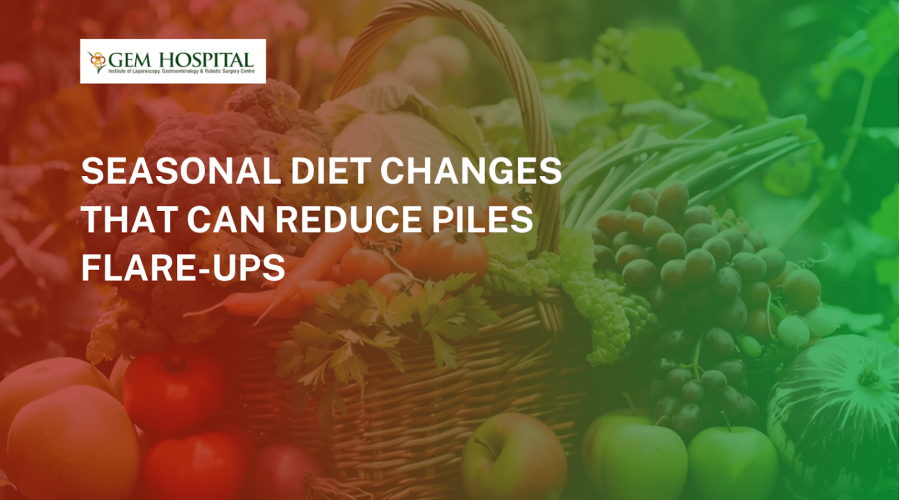Consult experienced hernia doctors in Chennai for expert surgical care. Advanced diagnosis, safe hernia surgery, and faster recovery with specialized treatment.
Seasonal Diet Changes That Can Reduce Piles Flare-Ups

Piles, more commonly referred to as hemorrhoids, are swollen veins in the anus or rectum that may cause pain, discomfort, and itching. Piles can flare-up for a number of reasons, including dietary changes, constipation, or sitting for long periods of time. Changing your diet is a very helpful way to control and manage flare-ups of piles. As the seasons change, so does your diet! Foods that may work well in one season may be less helpful in another, and by addressing your diet to the seasons, you can help keep your digestive system balanced and therefore reduce flare-ups.
Diet Changes by Season and Piles
During the warmer months, it is easy for the body to become dehydrated from sweating. Dehydration is a significant cause of constipation and poor digestion, especially in summer when people are often not eating enough fiber, resulting in hard stools that place more strain on the veins in the rectum. During cooler months, there is typically a reduction of fluids consumed, or it becomes easy for people to turn to more processed or heavier foods, which aggravates constipation and adds strain to digestion. Diet is something that is important to include when managing piles and flare-ups relative to other seasons!
Summer: Focus on Hydration and Fiber
In the summer, Hydration is key to preventing constipation and maintaining your regular bowel patterns! Dehydration and piles do not go together, as dehydration leads to hard, and often painful, stools.In addition to consuming adequate amounts of water, hydrating fruits and vegetables such as cucumbers, watermelon, and strawberries can be a healthy source of hydration. Consuming hydrating fruits and vegetables not only keeps you hydrated, but they can also be loaded with vitamins and minerals that support healthy digestion.
In the warmer months, it is equally important for the summer months to consume different fiber-rich foods. Fiber helps to soften stool, while helping facilitate bowel movements. It is very important to include more fruits, vegetables, and whole grain foods into your diet. Foods like mangoes, papaya, and guava, which become more abundant in the summer months can especially help make up for fiber needs, and can also help with digestion. Whole grains that are high in fiber, such as oats, brown rice, and quinoa can help prevent or alleviate constipation, while reducing strain on the rectal area.
Cold Months: Increase Fiber with Cooked Vegetables and Stews
When the weather begins to cool down, the body also signals to your mind it needs more warmth, and therefore, more heavy food, which can lead to your health in the summer months being compromised. Hearty cooked and heavy foods can feel satisfying, but if not balanced with fiber, can lead to constipation. In winter months, it can be beneficial to incorporate more cooked vegetables, like carrots, spinach, and sweet potatoes, which are less taxing on the stomach and even high in fiber.
Soups, stews, and broths can be other options in the winter months, providing hydration and a source of nutrients and fiber.Including lentils, beans, and chickpeas in addition to those foods will enhance your fiber intake, which is vital to preventing pile flare-ups. Eating flax seeds and walnuts—foods high in omega-3 fatty acids—may also help reduce inflammation and promote digestive health.
Diet Choices to Prevent Piles Year-Round
While seasons can help you think about adjusting your diet, there are also a couple of dietary practices year-round that may help prevent piles flare-ups.
Stay Hydrated: Regardless of the season, be sure to drink plenty of water throughout the day. Dehydration is one of the main causes of constipation that can contribute to piles. Strive to drink at least 8-10 glasses of water/day.
Increase Fiber Intake: Dietary fiber is vital to prevent constipation and facilitate bowel movements. Eat a variety of sources of fiber including whole grains, fruit, vegetables, nuts, and seeds. Soluble dietary fiber, such as that found in oats and apples, can be particularly helpful for softening stools.
Avoid Processed Foods: Processed and junk foods (which are often low in fiber and high in unhealthy fats) can aggravate piles. Reducing your consumption of fried foods, white bread, and sugary snacks will maintain appropriate digestion and reduce inflammation.
Practice Portion Control: Overeating, particularly larger meals, can add pressure to the digestive system and contribute to constipation. Try to eat smaller meals more often during the day, in order to maintain healthy functioning of the digestive system.
Avoid Straining: This is an important tip that draws directly upon diet. Straining upon bowel movements puts excessive pressure on the rectal veins, leading to increased symptoms of piles. Eating foods high in fiber, staying hydrated, and ensuring that you do not prolong your bathroom visits should reduce your tendency to strain.
Direct Control of Your Health by Food Choices
By implementing changes to accommodate the season, and incorporating these dietary practices, you substantially reduce the frequency and intensity of your piles flare-ups. Adequate food can promote better digestion, facilitate easier bowel movements while reducing the strain on the rectal veins, and assist with the development and maintenance of piles. If you are experiencing signs and symptoms of piles, or wish to learn more about effective dietary modification, Gem Hospital has good experience in treatment.
Our treatment team has a lot of professional experience to provide good ideas about diet and treatment for piles. Book an appointment today to take your first step towards improving your digestion health and better comfort.
Blogs & Article
Get advanced liver transplant treatment in Chennai with expert surgeons, modern technology, and comprehensive care for safe and successful outcomes.
Get advanced piles treatment in Erode with expert doctors. Safe procedures, modern technology, and effective care for fast relief and recovery.


